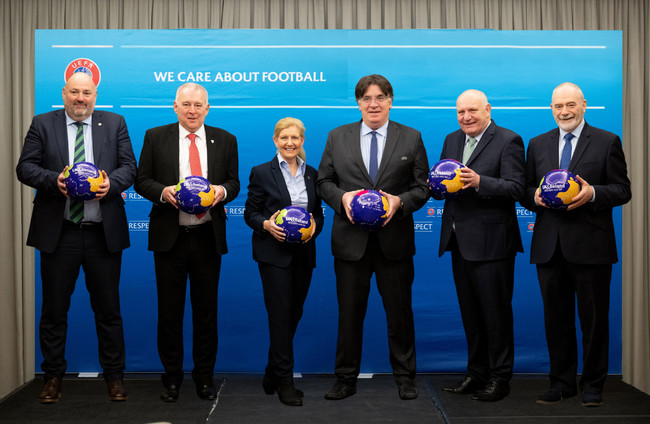So, we are co-hosting Euro 2028 with the UK?
Yep, it looks to be a formality now.
The FAI, along with the FAs of England, Wales, Scotland, and Northern Ireland, explored the possibility of hosting either Euro 2028 or the 2030 World Cup, before alighting on a bid for the Euros, primarily because they believed they would win it. So it has proved.
Turkey were initially the only rival to the Irish/UK bid for the tournament, and they also entered the process to host Euro 2032, rivalling Italy. In April it was announced that Turkey were now linking up with Italy to co-host in ’32, but there was no announcement regarding the status for 2028.
That all changed today. Uefa announced that Turkey’s focus on 2032 means they have withdrawn from the 2028 process, leaving the Irish/UK bid unopposed.
An FAI delegation will travel to Uefa HQ in Switzerland next Tuesday, where the bid to host the tournament will be ratified at a meeting of the Uefa Executive Committee.
How many games will we get? And how many stadiums are involved?
Ireland are set to host six games: four group games, a last-16 tie, and a quarter-final. And when we say Ireland, we mean Dublin. The only stadium in play here is the Aviva Stadium.
Croke Park was on an initial shortlist of 14 nominated venues, and it went as far as the GAA approving its use at a meeting of its Ard Chomhairle earlier this year.
However, it was dropped when the final list of venues was whittled down to 10. FAI CEO Jonathan Hill said a “one city, one venue” was central to the winnowing of venues, although London has two stadia among the final 10. Here are the full list of venues, with the final almost certain to be held at Wembley.
- Aviva Stadium, Dublin
- Casement Park, Belfast
- Hampden Park, Glasgow
- Principality Stadium, Cardiff
- Villa Park, Birmingham
- St James’ Park, Newcastle
- Everton Stadium, Liverpool
- Etihad Stadium, Manchester
- Tottenham Hotspur Stadium, London
- Wembley Stadium, London
Will Casement Park be developed in time?
All parties insist it will be done in time. It’s not the only ground that has to be developed for the tournament, with Everton’s new stadium at Bramley-Moore Dock still under construction. But the building work has at least started on Merseyside, as Casement Park has remained idle since 2013. Its development was stalled by legal challenges from local residents, but a 2022 challenge to overturn the 2021 planning permission it was granted was defeated.
Now it just remains to be seen who pays for it. Northern Ireland Secretary of State Chris Heaton-Harris has exuded confidence on the matter telling BBC NI, “We’ll get the money, don’t you worry.”
Another potential problem has arisen in the last few weeks, when it emerged one of the lead contractors on the project, The Buckingham Group, one of the lead contractors on the project, filed a notice of intention to appoint administrators, but was not in administration.
If Casement Park is not rebuilt in time for the tournament, it would be an embarrassment for Northern Ireland, as they won’t have another stadium big enough to host a game. Windsor Park falls short of the minimum 30,000-capacity requirement. If Casement is not ready, Northern Ireland faces becoming the answer to a quiz question: the tournament co-host who didn’t host a game.
Will we qualify automatically?
The qualification process has not been confirmed, but Uefa are not going to reserve five of the 26 spots at the tournament for the co-hosts. The most likely scenario – though we stress this is unconfirmed – is that all five co-hosts compete in qualification as per normal, with the two highest-ranked co-hosts who don’t qualify automatically then parachuted into the tournament.
“My guess would be for a tournament that may be hosted by five nations, all teams will be part of the qualification process”, said FAI CEO Jonathan Hill last month.
“You’re asking my personal views and I think that’s important from a commercial perspective. For example, that England are part of qualification. There are different ways of addressing it. I hope, and believe, that two teams will qualify automatically. It becomes part of the Uefa conversation as to how that works when all five teams go into the qualification process. I can’t go any further than that because it’s up to Uefa as to how that works.”
How much will it cost?
Minister for Sport Catherine Martin presented the costs to Cabinet earlier this year, with the projected sum total coming to €93 million, consisting of an estimated security and transport bill of €27.5 million each. Minister Martin stated the tournament would bring in €189 million into the State, a figure reportedly contested by the then-minister for Finance Paschal Donohoe. According to the Sunday Independent, Minister Donohoe was “not persuaded” by the scale of that projected windfall for the country, given many hotel rooms in Dublin would already be occupied at that time of the year.
What have the FAI said about today’s big news?
The FAI issued a brief statement in response to what is effectively a done deal.
“We are looking forward to presenting our bid to Uefa on 10 October. These are exciting times, and we have a very compelling Euro 2028 proposal for Uefa. Our bid is ground-breaking for the Men’s European Championships and will deliver lasting legacies across the whole of Ireland and the UK.
“We will share full details of the bid in Nyon next week and are confident that Uefa will approve our candidacy to host Euro 2028.”
What will that ‘lasting legacy’ be?
This is what is most crucial for the FAI to communicate. At the moment, the obvious legacy of a football tournament in Ireland will be the fact the British government funded the rebuilding of a GAA stadium in Belfast.
The FAI must make it clear to its own constituencies precisely what then tournament’s legacy will be, along with how and when it can be achieved. Football people across the country are understandably worried about the sins of the past, when headline-grabbing international projects were privileged while League of Ireland grounds and grassroots facilities continued to crumble. Dalymount Park, for instance, was supposed to be redeveloped as part of the legacy of Euro 2020, but the latest projected opening date for the refurbished stadium is 2026.
The Euros bid has attracted big political support, however, and the FAI need every bit of political support they can get at the moment, as they are asking the government for €517 million across the next 15 years to bring facilities at all level up to scratch.
But the FAI have to explain the benefits of this bid in terms more material than “ground-breaking”, and “exciting” for it to be enthusiastically endorsed by all.


